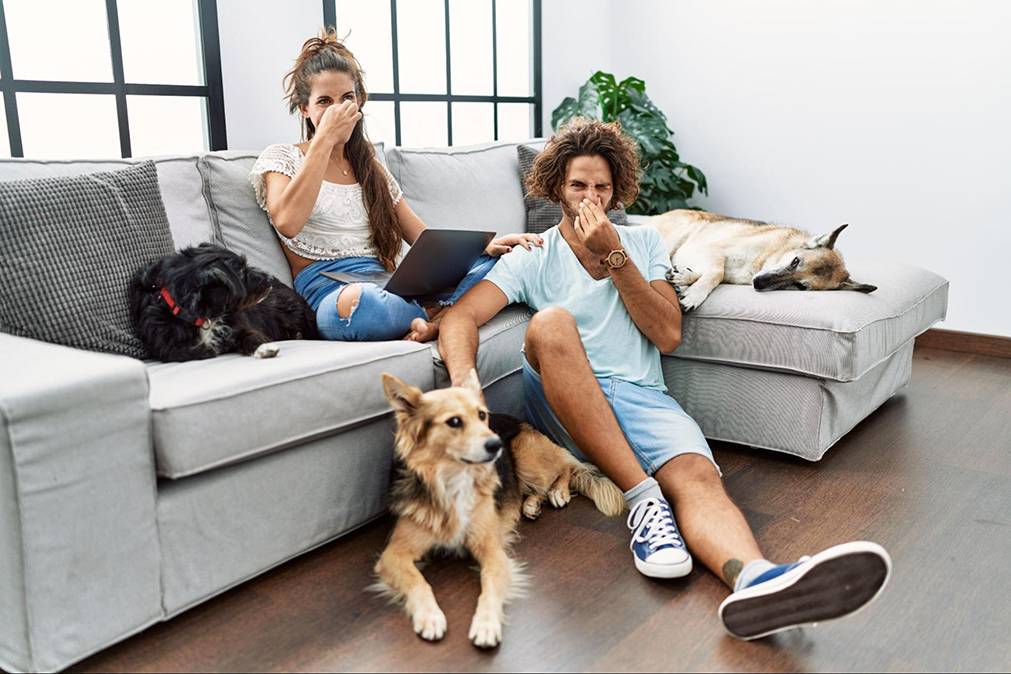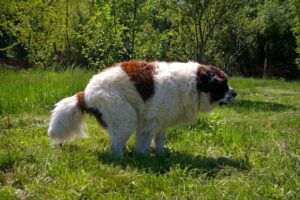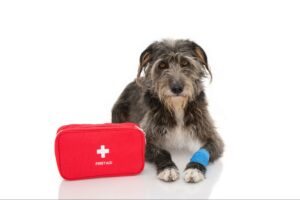Has this ever happened to you?
You and the family are sitting around, maybe watching TV, with the dog sleeping at your feet, and all is well. Then, without warning, it’s like a mustard gas attack as a terrible aroma fills the room. Everyone starts coughing and maybe clearing out, expressing their displeasure.
The dog looks up at the commotion and seems to be the only one enjoying it, oblivious that he’s the culprit.
Congratulations! Like countless other dog owners, you’ve just been a victim of the infamous silent but deadly canine flatulence. The “silent” part is a fact of anatomy. Because the usual position of a dog’s rectum is horizontal, their sphincter doesn’t have to be quite as tight as a human’s; our rectums generally point straight down, so we need extra security.
A looser opening means less resistance, so most dogs can pass gas while making little if any, sound. So, unlike a human doing the same, dogs rarely give an audible warning of the coming storm.
One French inventor, Christian Poincheval, is now selling a powder that he claims will make pet flatulence smell like flowers, inspired by his earlier creation of pills that will do the same thing for humans in the scents of ginger, chocolate, or roses. So it is possible to turn your dog into a walking air freshener, but what if you want to reduce the frequency and eliminate the odor almost entirely?
Why Does it Smell Bad When Dogs Pass Wind?
Like humans, a dog’s intestines are full of bacteria that feed on the food passing through us and release gas. Depending upon the composition of that gas, the smell can be benign or horrifying — sulfur is a particularly nasty culprit. Also, depending on other factors, a dog can be more or less inclined to sudden flatulence. Here are some of the causes.
What Causes Flatulence in Dogs?
It is normal to have some gas while food goes through the digestive process. However, excessive flatulence or very foul-smelling gas shouldn’t be happening. When a dog’s digestive system has food that is having a hard time processing, it essentially sits in the colon and ferments. Digestive issues typically stem from obesity, poor diet, lack of exercise habits, and sometimes medical conditions like a parasite. For most dogs, as with humans, it all comes down to diet and lifestyle.
Food Consumed
Like humans and the infamous beans. Some foods are likelier to make a dog flatulent than others. Things to avoid are beans, cauliflower, cabbage, brussel sprouts, meat, and soybeans.
Eating low-quality food full of soy or corn fillers can also cause problems; unlike humans, dogs are not fully adapted to digest vegetable fiber.
Finally, if your dog is lactose intolerant and eats dairy products, this can increase the frequency and foulness of flatulence.
Top Ten Foods That Give Dog Gas
- Legumes and beans
- Low-quality dog food
- Dairy
- Too many fruits and vegetables
- Too much meat
- High-fat foods and treats
- Food from garbage cans
- Spicy food
- Table scraps
- Sudden change in diet
How Your Dog Eats
In dogs and humans, a significant source of intestinal gas comes from swallowed air, although this flatulence is rarely as smelly. If your dog gulps their food down too quickly, it’ll swallow a lot of air, and there are only two ways for it to come back out — either in a burp from the front end or a belch from the rear.
The Dog’s Breed
Some breeds are more inclined to flatulence than others, as any boxer owner will tell you. This tends to be an issue with dogs with brachycephalic or “pushed-in” faces, like pugs, bulldogs, Pekinese, and Boston terriers; since they breathe through their mouths, they naturally swallow a lot of air.
Other breeds that tend to be gassy include the German shepherd, mastiff, Labrador retriever, Doberman pinscher, poodle, and beagle. If you own one of these breeds, that powder to give them a pleasant scent might not be a bad idea.
Medical Conditions
If your dog is suddenly excessively gassy, it may be due to a medical condition. Possible causes include pancreatitis, liver disease, food allergy, or lactose or grain intolerance.
If your dog has diarrhea, vomiting, or loss of appetite in combination with excess flatulence, it’s time to visit the vet.
Parasites, like intestinal worms, can also worsen the problem, so it’s a good idea to talk to your vet about possibly prescribing a broad-spectrum intestinal wormer for your dog every three months.
How to Reduce Flatulence in Dogs
If your dog is regularly gassing you out of the house, there are steps you can take to stop flatulence in your furry friend.
Better Quality Food
Feed your dog the highest quality food you can afford, high in protein and without fillers like corn, wheat, or soy. Many cheaper dog foods contain large amounts of beans and peas, which lead to gas.
In all cases, though, remember to make changes to your dog’s diet gradually. They do not adapt as quickly as humans do to new food. Also, try to limit the variety. Bouncing from chicken to beef to lamb and back constantly can contribute to your dog’s gassiness.
Tips for Choosing the Best Food for Your Dog
Your vet is a great resource for selecting high-quality foods for your furry pal, but you can also research options on your own. Look for labels that include the following:
- Little to no chemical preservatives
- The label includes words like “low residue” or “highly digestible”
- The ingredient list contains at least two animal-based proteins at the top
Stop Offering Human Food.
Also, avoid giving your dog human food, especially if it’s fatty, sugary, or high in carbs, and cut down on the dog treats — more to digest equals more to expel. How we cook our food does not usually sit well with a dog’s digestive system, and the ingredients cause smelly flatulence that is hard to live with.
Exercise, Exercise, Exercise
An active pup is crucial to having a balanced dog and can help them have a balanced digestive system and reduce flatulence in our pets. Exercise stimulates the intestines to do their job efficiently, and the more efficient digestion is, the less gas will be produced.
Take plenty of time for the walk and outdoor playtime, and don’t worry if it doesn’t work at first — it’s much better to be outside with your dog than when she lets loose with a barn burner.
Encourage Slower Eating
If your dog eats too quickly, try putting a ball in their bowl or buying a slow-feed dog dish, which has raised obstacles that will make your dog eat more slowly. An option you can use right away is a muffin tin. Put a small amount of food in each spot to add time between eating.
Weight Management
Obesity can contribute to excess smelly flatulence in any breed, so if your dog is overweight, work with your vet and design a diet and exercise program to help him lose weight and develop a healthy balance of intestinal bacteria.
Keep Trash Secure
When dogs eat spoiled food or go digging in the garbage can for a treat, they risk getting sick to the stomach, which can cause gas. Keep your kitchen trash secure, and when on walks, train your dog to obey when you give the command to “leave it.”
Natural Remedies
Yogurt with live culture can help adjust the balance of bacteria in your dog’s gut, as can canine probiotics from your vet, leading to lower production of volatile gasses.
Ginger and edible peppermint oil are known to reduce flatulence symptoms naturally. Add a few drops of peppermint oil to the water bowl or sprinkle some ginger on top of their food. Talk to your vet before incorporating any natural remedies into your dog’s diet.
Supplements Can Help
Talk to your veterinarian about supplements to help with your furry friend’s farting. Supplements paired with a healthy diet and exercise can be a beneficial way to reduce flatulence. Ask your dog’s vet for the best supplement for them.
A Breath of Fresh Air
A dog’s gas will never naturally smell like roses and rainbows, but it doesn’t have to reek like a slaughterhouse inside a burning sewage treatment plant. With a few simple steps, you should be able to reduce the volume and the aroma and take the “deadly” out of “silent.” Your nose — and your dog — will thank you.
Has your dog ever embarrassed you with her farting? Or do you have a remedy that has worked for your pup? Tell us all about it in the comments.











